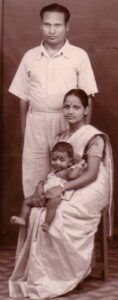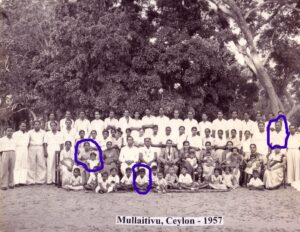Remembering my Father on his Birth Centenary Year
by Sachi Sri Kantha, December 12, 2023
My father (Sivapragasam Sachithanantham, 1923-2003), whom my sister and I called Aiyah was born in Puloly West, Point Pedro, Ceylon, to Vinasithamby Sivapragasam (1882-1936) and Packiyam (1889-1945), as the sixth and youngest child. Ten years ago, I posted Aiyah’s autobiographical notes about his life in Point Pedro during 1920s-1930s. [https://sangam.org/life-point-pedro-circa-1920s-1930s/] This year, marks Aiyah’s birth centenary, and I reached 70 on last May 8th.

Sachi (7 months, Dec 1953) with parents
Laurence Olivier recorded his thoughts in his book, Confessions of an Actor (1982), about his own father as follows:
“I am sure that to anyone fortunate enough to be brought up in a close and loving family the death of one’s old man feels something like a blunt biff to the nose. Having suddenly no protective influence between oneself and death, and finding oneself alarmingly in the vanguard of life, feels more strange than the first day at school; one feels the new ‘atmosphere’ to be unfriendly, nasty, draughty.”
In two sentences and seventy words, how profoundly thespian Laurence Olivier (1907-1989) summed up my then-anguish. When Aiyah reached 80 in Aug 2003, it was an age-bar neither any one of his six elder siblings who have predeceased him nor his two parents managed to cross. When my sister’s family emigrated to New Zealand, Aiyah opted to move to New Zealand at the age of 75, leaving the Hindu cultural mileau, Tamil networks and seven decades of memories of Sri Lanka. He would have preferred NOT to leave the island in late 1998, if not for a harrowing life threatening experience he had faced in mid-1990s.
A Gestapo-like police search at midnight hauled Aiyah into the dreaded vehicle and before he realized what was happening to him, he was locked up in the police station cell nearest to his residence. The charge against him was that he was playing host to ‘terrorists’ at his home. Due to the kind-heartedness of our good neighbor Ekanayake, belonging to the majority Sinhalese ethnic group, whose sibling was a ranking member of the Sri Lankan police service, Aiyah was released after 24 hours as an innocent victim of an unfounded allegation. Aiyah’s alleged ‘crime’ was providing psychological counseling, as a quasi-astrologer, to the war-scarred Tamil ethnics in Colombo. But that harrowing experience had scared and scarred Aiyah beyond redemption and encouraged him to leave the land of his birth and friendly networks, and receive refuge in New Zealand at the age of 75.
Aiyah’s Life in Synopsis
At age 13 Aiyah lost his own father, when my paternal grandfather Vinasithamby Sivapragasam died at age 54. When he was doddering towards his final exit, Aiyah had outlived his father by 26 years. This is a feat which I cannot realistically hope of matching now. I need to become a centenarian first in 2053 and live for six more years to equal Aiyah’s feat.
After his secondary schooling at Hartley College, Point Pedro in 1930s, prior to spending his productive 35 years in the clerical service of the Ministry of Health in Sri Lanka, Aiyah worked in two private firms, Walkers Ltd. and an auditing firm Duncan Watkins and Ford, for 4 years. The prevailing employment notion among middle class Jaffna Tamils of that era was – ‘Even if you herd chicken, do it in a government job’ [Kozhi maithalum, Cornamentile meikanum]. As per this dictum, on the advice of his paternal uncle, at the age of 23, Aiyah joined the Government Health Clerical Service. This uncle was the youngest brother of Aiyah’s father and assumed the guardian role for him following my grandpa’s death in 1936. He also admonished Aiyah ‘If you don’t have a government job, arranging a good marriage among relatives will be not easier.’ As such, Aiyah joined the clerical service of the Ministry of Health of pre-independent Ceylon in October 1946, and worked at the hospitals in Nivitigala, Badulla and Puttalam.
It was during this time, in April 1952, Aiyah’s marriage was arranged to my mother Puvaneswary. A year later, in May 1953, I was born. The first photo of me was taken in a studio in December 1953. Though my parents didn’t have the luxury of a wedding photo, I’m thankful that Aiyah had wished to register my early pre-crawling days in a photo. My sister Kanchana arrived in late 1954. Though I hardly remember the occasion (I was only 4 years old!), a group photo taken with my father’s colleagues at the Mullaitivu Base Hospital in 1957 remains a cherished item in my photo album.

Mullaitivu Hospital group photo 1957 – Sachi (4 years) seated in the ground, father standing(1st row) 2nd from right, mother sitting 2nd from left, with sister in front of her.
From January 1959 until his retirement in 1983, Aiyah served in different hospitals in Colombo. Occasionally he regaled us with the stories of drunken physicians, lovelorn interns as well as voluble patients including woman prostitutes and their non-paying clients. One of Aiyah’s work stations in the 1960s was the Anti-Venereal Diseases Campaign Office in Colombo. His favorite wisecrack was ‘Never visit a hospital, other than for an emergency. More germs are bred there than in a bordello.’ His caustic note as a front office support staff of doctors may sound exaggerated, but based on the mileau of his work stations in colonial and post-independent Ceylon, the gist of his logic couldn’t be far from wrong.
Though Aiyah didn’t enter the portals of any university buildings, he toiled hard so that his son had a university education and enjoyed the bells and whistles of an academic life. He experienced joy in addressing his letters to me with the grand prefix ‘Professor’. Though I felt somewhat uncomfortable about this epistolary embellishment of my father, I also felt voiceless to express my dissent. Why deprive a vicarious pleasure of a father?
Aiyah was a fan of singing Tamil movie stars M.K. Thyagarajah Bhagavathar (whom he called with the dimunitive ‘Thyagan’) and comedian N. S. Krishnan. He also talked to me about the talented actor cum lyricist K.P. Kamatchisundaram. Among the woman artistes, diva K.B. Sundarambal was his favorite. [Please check my earlier essay on her, in this link, https://sangam.org/sundarambal-and-kittappa/] Also he admired the sweet voices of D.K. Pattammal and N.C. Vasanthakokilam. Aiyah totally lost interest in Tamil movies, when the next generation of Tamil movie stars (MGR, Sivaji Ganesan, Gemini Ganesan and SSR), who couldn’t sing, gained status in the second half of 1950s. To my knowledge, in 1960s, he went to a movie theater, only to watch two Hindu devotional movies, (Thiruvilayadal and Kanthan Karunai), in which K.B. Sundarambal starred, and a re-screening of his old favorite, Thyagan’s hit movie Haridas (1944), in Colombo.
Among the Eelam artists and poets, I do remember Aiyah reminiscing and respecting the talents of satire poet and wit Kanthapillai Velupillai (aka, Kalladi Velan, 1860-1944), Tamil Shakespearean stage actor ‘Kalai Arasu’ K. Chornalingam (c. 1900-1982; recognized for his Shylock act) and one ‘buffoon’ Chelliah. Kalladi Velan had died before my time, but, I do remember seeing Chornalingam during 1960s in public functions. For my flute debut performance held in Colombo on December 3rd, 1971, Aiyah sent an invitation card to Chornalingam (then residing in Manipay) and was delighted to receive a congratulatory message to me, from him. Sadly, the name ‘buffoon’ Chelliah fails to register in my mind, as he was not featured in the print/radio media or stage from 1965 onwards; I guess he should have been a stage comedian (as indicated by the prefix ‘buffoon’) in Jaffna district during pre-1940s.
It was because of Aiyah’s interest in music that he arranged tutors for me to learn flute and my sister to learn violin in 1960s. Aiyah was delighted to arrange and stage the release of my Tamil music book on August 18, 1978 Friday, at the New Kathiresan Hall, Colombo. The chief guest for this function was M. Sivasithamparam, the then MP for Nallur electorate and the President of Tamil United Liberation Front. This function was presided by Tamil activist M.K. Eelaventhan. Traditional Tamil scholar Tenpuloliyur Mu. Kanapathipillai (father of radio and TV personality, Kamalini Selvarajan), a pal of my father’s, was also an active supporter for this book release function.
Final Days
When he reached 80, in August 2003, Aiyah himself seems to have progressed along Elizabeth Kubler-Ross’s five stages for terminally ill cancer patients – denial, anger, bargaining, depression and acceptance. I could visit Aiyah twice – once in July and again during the final week of his life from October 12th to 18th. I heard from my kin that he had lost his speech ability four days before my arrival there. When I reached his bedside, though he had lost his speech ability, he could recognize me by face cum voice, and shed tears. While I was visiting Aiyah during his final week, the palliative care nurse politely asked my permission to increase the injected morphine dose day by day, under the pretext of pain relief. Later I found out that morphine also causes respiratory distress. I could meet the physician, who looked after Aiyah during his final days. As my one week leave at the university in Japan couldn’t be extended, reluctantly I left New Zealand on Oct 18th, while Aiyah’s condition shifted into the death rattle phase. My return flight from Auckland to Tokyo, with a stopover in Kuala Lumpur was nothing but saddening. The day after I reached home in Gifu City, I received the phone message that Aiyah had died on October 20, 2003 Monday.
Hollywood star Kirk Douglas valiantly titled his autobiography as ‘The Ragman’s Son’ (1988), to highlight the lowly profession his father held as a Russian immigrant in his new homeland America. He wrote, “A parent’s death makes you grow up, and growing up is hard. You think that when you do grow up, something wonderful will happen. No more problems, like magic. Then, you grow up, You become a big man. Your voice is lower. But inside you are still a child…”
*****